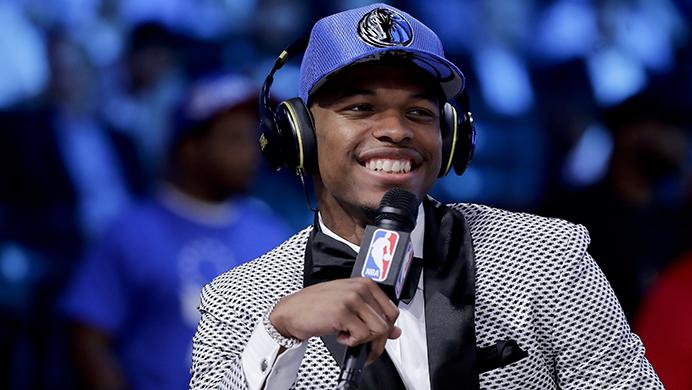Who in the NBA had a successful draft and who could have done better?
By Adam Hensley
Three things in life are guaranteed: death, taxes, and LaVar Ball opening his mouth on national television.
NBA fans have been blessed with an action-filled off-season up to now, and the draft lived up to the hype.
Philadelphia traded with Boston to acquire the top pick in the draft and selected Markelle Fultz, and the elder Ball got his wish as Los Angeles drafted son Lonzo.
Both draft picks seem to be locks for immediate-impact players who are on track to have a long future in the league, but those moves were no-brainers. Other teams had success, or failure, when trading or drafting on June 22. Without further ado, I present the winners and losers of the NBA draft.
Winner: Dallas Mavericks
Dallas took the best player available with the ninth pick, and it just so happened it was a position of need.
NC State’s Dennis Smith was the most explosive player in the draft. He flashed pre-injury Derrick-Rose moves, rising to finish at the rim and making shots with contact.
Smith’s name fell behind Fultz and Ball in the draft, and as Maverick fans will be thankful for, he fell right into the organization’s lap.
There is no solid starter in Dallas at the point, so Smith enters with a position to contribute immediately and pair nicely with Harrison Barnes and Dirk Nowitzki.
If the Mavericks can re-sign Nerlens Noel this off-season, they’ll have themselves a competitive starting unit.
Winner: Sacramento Kings
The Kings gambled by trading Zach Collins, the 10th selection in the draft, and Sac-town very well could have drafted three future starters.
De’Aaron Fox at No. 5 was destined to happen, despite the Kings’ frequent front-office blunders. The Kings didn’t mess up this pick or any of their selections for that matter.
Fox, the best defensive point guard in the draft, gives Sacramento a quick, athletic scoring and assist threat. Josh Jackson, the North Carolina product, is a well-rounded perimeter-scorer, a safe choice but a solid one, too.
Enter Harry Giles.
If injuries hadn’t plagued his knees, he could have been a top-five pick in the draft. Instead, he fell to the 20th slot.
Playing the what-if game can be risky, especially in NBA front offices, but if Giles’ body holds up, he’ll be a starter in the NBA, especially with his explosiveness, leaping ability, lateral quickness, and sure-fire ability to hit from 15 feet and in.
Throw in Frank Mason III, an undersized but proven point guard from Kansas, and you’ve got the recipe for a successful draft.
Loser: Chicago Bulls
Lauri Markkanen, one of the best shooters in the draft, was a solid acquisition.
Trading away Jimmy Butler and draft picks for Zach LaVine, Kris Dunn, and the rights to Markkanen left NBA fans scratching their heads and comparing the deal to highway robbery.
Chicago appears to be in rebuilding mode, but the Bulls could have — and should have — gotten more for Butler, one of the league’s top two-way players.
Winner: Minnesota Timberwolves
Dealing for Butler was arguably the best move of the draft.
Trading away a role player, a starter (who played in 47 games last season), and essentially swapping picks for the former Chicago star was almost too good to be true.
Minnesota needed a veteran presence just like Butler to take the step from a 30-win team to a playoff threat. He joins Karl-Anthony Towns and Andrew Wiggins, two of the most promising young players in the league, to form a deadly trio.
The Timberwolves drafted Justin Patton, a 7-footer from Creighton, with Chicago’s 16th pick. He’s more of a project player but could find his way onto the court before the season is over; his upside proved to be too valuable for Minnesota not to pass up on him.
Loser: Toronto Raptors
Toronto entered the draft with one pick, selecting Indiana’s OG Anunoby with the 23rd selection. Similar to Giles, Anunoby entered the draft with injury concerns. A torn ACL in January certainly hurt his draft stock. Unlike Giles, however, he does not have a solid offensive role.
Anunoby flashed the ability to hit from long range when unguarded, but he does not command a consistent shot, nor can he reliably create one.
The Raptors could have selected forwards Tyler Lydon or Caleb Swanigan (the 24th and 26th selections, respectively) but gambled on a player recovering from a major surgery.
Winner: Portland Trailblazers
The trade between Portland and Sacramento could end up being a win-win for both sides.
Zach Collins, a top-10 selection despite playing fewer than 18 minutes per game at Gonzaga, commands a fluid jump shot and head-turning coordination for a big his size. While he’s not as proven of a shooter as Markkanen was at Arizona, Collins flashed all-around scoring capability while locking down on defense.
Portland took Swanigan at pick No. 26, the biggest steal of the draft. With a game similar to Al Jefferson (excellent post moves and a jumper from range), Swanigan’s style of plays pairs well with Collins.



